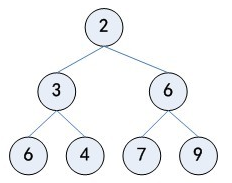Python常用数据结构之heapq模块
Python数据结构常用模块:collections、heapq、operator、itertools
heapq
堆是一种特殊的树形结构,通常我们所说的堆的数据结构指的是完全二叉树,并且根节点的值小于等于该节点所有子节点的值

常用方法
| heappush(heap,item) | 往堆中插入一条新的值 |
| heappop(heap) | 从堆中弹出最小值 |
| heapreplace(heap,item) | 从堆中弹出最小值,并往堆中插入item |
| heappushpop(heap,item) | Python3中的heappushpop更高级 |
| heapify(x) | 以线性时间将一个列表转化为堆 |
| merge(*iterables,key=None,reverse=False) | 合并对个堆,然后输出 |
| nlargest(n,iterable,key=None) | 返回可枚举对象中的n个最大值并返回一个结果集list |
| nsmallest(n,iterable,key=None) | 返回可枚举对象中的n个最小值并返回一个结果集list |
常用方法示例
#coding=utf-8 import heapq
import random def test():
li = list(random.sample(range(100),6))
print (li) n = len(li)
#nlargest
print ("nlargest:",heapq.nlargest(n, li))
#nsmallest
print ("nsmallest:", heapq.nsmallest(n, li))
#heapify
print('original list is', li)
heapq.heapify(li)
print('heapify list is', li)
# heappush & heappop
heapq.heappush(li, 105)
print('pushed heap is', li)
heapq.heappop(li)
print('popped heap is', li)
# heappushpop & heapreplace
heapq.heappushpop(li, 130) # heappush -> heappop
print('heappushpop', li)
heapq.heapreplace(li, 2) # heappop -> heappush
print('heapreplace', li)
>>> [15, 2, 50, 34, 37, 55]
>>> nlargest: [55, 50, 37, 34, 15, 2]
>>> nsmallest: [2, 15, 34, 37, 50, 55]
>>> original list is [15, 2, 50, 34, 37, 55]
>>> heapify list is [2, 15, 50, 34, 37, 55]
>>> pushed heap is [2, 15, 50, 34, 37, 55, 105]
>>> popped heap is [15, 34, 50, 105, 37, 55]
>>> heappushpop [34, 37, 50, 105, 130, 55]
>>> heapreplace [2, 37, 50, 105, 130, 55]
堆排序示例
heapq模块中有几张方法进行排序:
方法一:
#coding=utf-8 import heapq def heapsort(iterable):
heap = []
for i in iterable:
heapq.heappush(heap, i) return [heapq.heappop(heap) for j in range(len(heap))] if __name__ == "__main__":
li = [30,40,60,10,20,50]
print(heapsort(li))
>>>> [10, 20, 30, 40, 50, 60]
方法二(使用nlargest或nsmallest):
li = [30,40,60,10,20,50]
#nlargest
n = len(li)
print ("nlargest:",heapq.nlargest(n, li))
#nsmallest
print ("nsmallest:", heapq.nsmallest(n, li))
>>> nlargest: [60, 50, 40, 30, 20, 10]
>>> nsmallest: [10, 20, 30, 40, 50, 60]
方法三(使用heapify):
def heapsort(list):
heapq.heapify(list)
heap = [] while(list):
heap.append(heapq.heappop(list)) li[:] = heap
print (li) if __name__ == "__main__":
li = [30,40,60,10,20,50]
heapsort(li)
>>> [10, 20, 30, 40, 50, 60]
堆在优先级队列中的应用
需求:实现任务的添加,删除(相当于任务的执行),修改任务优先级
pq = [] # list of entries arranged in a heap
entry_finder = {} # mapping of tasks to entries
REMOVED = '<removed-task>' # placeholder for a removed task
counter = itertools.count() # unique sequence count def add_task(task, priority=0):
'Add a new task or update the priority of an existing task'
if task in entry_finder:
remove_task(task)
count = next(counter)
entry = [priority, count, task]
entry_finder[task] = entry
heappush(pq, entry) def remove_task(task):
'Mark an existing task as REMOVED. Raise KeyError if not found.'
entry = entry_finder.pop(task)
entry[-1] = REMOVED def pop_task():
'Remove and return the lowest priority task. Raise KeyError if empty.'
while pq:
priority, count, task = heappop(pq)
if task is not REMOVED:
del entry_finder[task]
return task
raise KeyError('pop from an empty priority queue')
Python常用数据结构之heapq模块的更多相关文章
- Python常用数据结构之collections模块
Python数据结构常用模块:collections.heapq.operator.itertools collections collections是日常工作中的重点.高频模块,常用类型由: 计数器 ...
- Python常用内置模块之xml模块
xml即可扩展标记语言,它可以用来标记数据.定义数据类型,是一种允许用户对自己的标记语言进行定义的源语言.从结构上,很像HTML超文本标记语言.但他们被设计的目的是不同的,超文本标记语言被设计用来显示 ...
- Python常用的内建模块
PS:Python之所以自称“batteries included”,就是因为内置了许多非常有用的模块,无需额外安装和配置,即可直接使用.下面就来看看一些常用的内建模块. 参考原文 廖雪峰常用的内建模 ...
- python常用数据结构讲解
一:序列 在数学上,序列是被排成一排的对象,而在python中,序列是最基本的数据结构.它的主要特征为拥有索引,每个索引的元素是可迭代对象.都可以进行索引,切片,加,乘,检查成员等操作.在py ...
- python常用数据结构(1)
python中有四种最常用的数据结构,分别是列表(list),字典(dict),集合(set)和元组(tuple) 下面简单描述下它们的区别和联系 1.初始化 不得不说,python数据结构的初始化比 ...
- Python常用数据结构(列表)
Python中常用的数据结构有序列(如列表,元组,字符串),映射(如字典)以及集合(set),是主要的三类容器 内容 序列的基本概念 列表的概念和用法 元组的概念和用法 字典的概念和用法 各类型之间的 ...
- python 常用数据结构使用
python 字典操作 http://www.cnblogs.com/kaituorensheng/archive/2013/01/24/2875456.html python 字典排序 http:/ ...
- python常用数据结构的常用操作
作为基础练习吧.列表LIST,元组TUPLE,集合SET,字符串STRING等等,显示,增删,合并... #===========List===================== shoplist ...
- python常用数据结构
0. 字典初始化 d = {'a':1,'b':2} 或 d={} d['a'] = 1 d['b'] = 2 是不是和json格式数据很相似,语法和JavaScript又很相似 1. 变量接受序列分 ...
随机推荐
- CentOS 7安装Tomcat8
一.安装环境 tomcat的安装依赖于Java JDK,需要先安装配置正确的JDK http://www.cnblogs.com/VoiceOfDreams/p/8376978.html 二.安装包准 ...
- 【总目录】——概率论与数理统计及Python实现
注:这是一个横跨数年的任务,标题也可以叫做“从To Do List上划掉学习统计学”.在几年前为p值而苦恼的时候,还不知道Python是什么:后来接触过Python,就喜欢上了这门语言.统计作为数据科 ...
- 日历插件——laydate.js
laydate是一款很好用的日历控件,兼容了包括IE6在内的所有主流浏览器,默认有三种皮肤,如需其它皮肤可去官网下载http://www.layui.com/laydate/ 一.核心方法:layd ...
- Linux命令:useradd
Linux下:useradd 等价于 adduser Aix下:useradd 来自为知笔记(Wiz)
- Nginx+Geoserver部署所遇问题总结
文章版权由作者李晓晖和博客园共有,若转载请于明显处标明出处:http://www.cnblogs.com/naaoveGIS/ 1.背景 该问题的最终解决离不开公司大拿whs先生的指点,先表示感谢. ...
- JDK安装及Tomcat安装
JDK安装及Tomcat安装 JDK 解压JDK到常用盘符 D为例 Tomcat安装 将tomcat.zip解压到常用的根目录下,我这里以D盘为例.这样就算安装好了! 接下来开始配置环境变量,打开环境 ...
- 主备(keepalived+nginx)
实验环境 系统: centos 6.9 mini 机器名 ip 虚拟ip kn1 192.168.126.10 kn2 ...
- Spring 当 @PathVariable 遇上 【. # /】等特殊字符
@PathVariable注解应该不是新鲜东西了Spring3.0就开始有了 URL中通过加占位符把参数传向后台 举个栗子,如下比较要说的内容比较简单就大概齐的写一下 画面侧 $.ajax({ typ ...
- MonogoDB 练习一
1.解析文件,仅处理 FIELDS 字典中作为键的字段,并返回清理后的值字典列表 需求: 1.根据 FIELDS 字典中的映射更改字典的键 2.删掉"rdf-schema#label&quo ...
- c#扩展方法的使用,实现的几个功能
用扩展类写了一个管理类: using Newtonsoft.Json.Linq; using System; using System.Collections.Generic; using Syste ...
